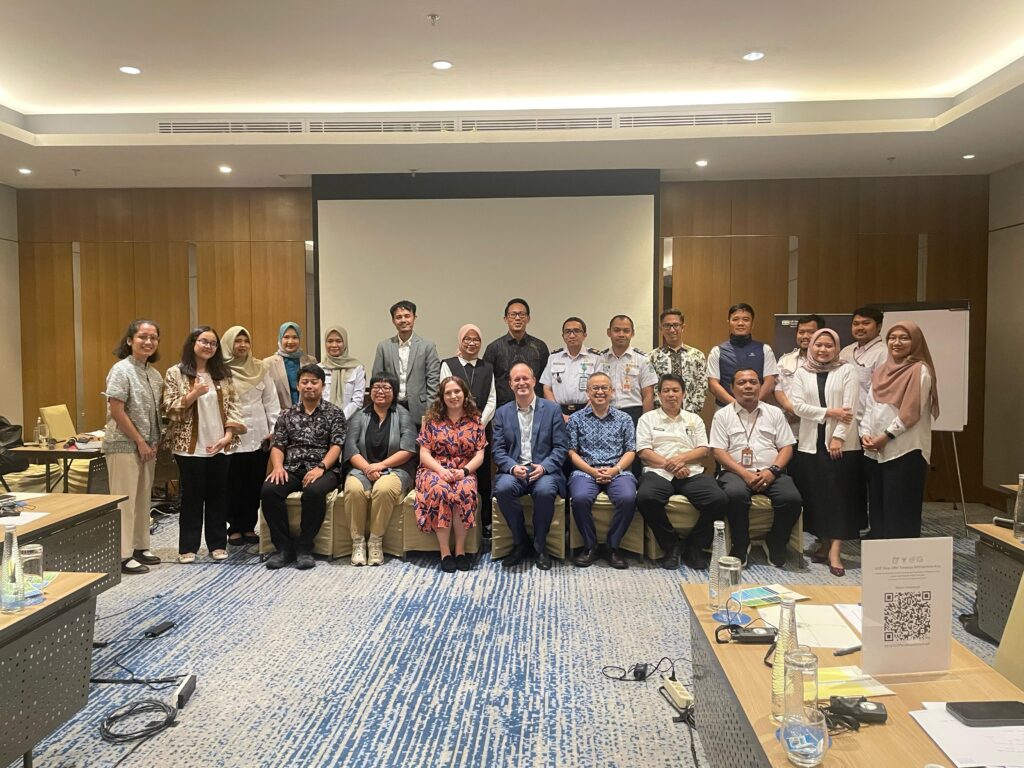- GCIEP is accelerating the Sustainable Urban Mobility Plan (SUMP) for the Greater Surabaya Metropolitan Area (GKS+) in East Java.
- Transport for London (TfL) contributed best practices on planning, integration and innovation for sustainable urban transport.
- Four capacity-building workshops were held, culminating in 14 identified priority projects to advance low-carbon transport.

Key stakeholders meet to advance sustainable, low-carbon urban transport in GKS+.
The UK Government, through the Green Cities, Infrastructure and Energy Programme (GCIEP) of the Foreign, Commonwealth and Development Office (FCDO), in partnership with Indonesia’s Ministry of National Development Planning (Bappenas), is accelerating the Sustainable Urban Mobility Plan (SUMP), approved by Bappenas in July 2024. It is a part of broader efforts to achieve a low-carbon, integrated and inclusive transport system for the region, encompassed of ten regencies and cities: Surabaya, Mojokerto (City and Regency), Gresik, Bangkalan, Sidoarjo, Lamongan, Tuban, Jombang and Bojonegoro.
A series of four capacity-building workshops were held in Surabaya, designed to strengthen local understanding and planning capabilities:
- Workshop A – Vision for GKS+ (23 January 2025): Focused on establishing a shared vision for future mobility.
- Workshop B – GKS+ Mobility Conditions (11 February 2025): Delivered a comprehensive SWOT analysis of current transport systems.
- Workshop C – Project Prioritisation (12 March 2025): Enabled evaluation and ranking of transport initiatives.
- Workshop D – Finalising Priority Projects (18 March 2025): Supported final selection using the FUTURES Framework.
TfL actively contributed to Workshops A, C and D, offering insights on London’s transport strategy and operations. TfL’s contributions included:
- Presenting the Avoid-Shift-Improve Framework and nature-based solutions for sustainable urban mobility.
- Sharing approaches for scaling project impact and fostering system integration.
- Introducing data-driven and digital tools to guide network optimisation and planning.
Additionally, a local best practice on transit-oriented development (TOD) in Indonesia was showcased, enriching the exchange of regional and international perspectives.
Key outcomes of the workshops included the identification of six guiding principles for GKS+ mobility, to be integrated, inclusive, human-centred, multimodal, low-carbon and well-connected. While fourteen priority projects were defined across six thematic areas: active mobility, payment systems, climate resilience, urban development, public transport and governance. These projects serve as the backbone of a transitional framework, structured by the Three-Horizon approach.
Dian Palupi Chrisdiani, Head of Infrastructure and Regional Planning at Bappeda Gresik, commented:
“Amidst prevailing coordination challenges across government levels that frequently impede cross-sectoral integration, GCIEP presents a strategic solution by showcasing best practices from Transport for London (TfL), illustrating that inter-agency collaboration is essential to achieving a sustainable, low-carbon and environmentally conscious transport system.”
By learning from London’s experience, the GKS+ region is well positioned to adopt strategic network management, enhance public transport accessibility and embed innovation through digital and data-driven solutions—paving the way for a more sustainable urban future.
The UK’s Green Cities, Infrastructure and Energy Programme is tackling climate change and extreme poverty by accelerating the delivery of sustainable green cities and climate-resilient infrastructure
Published
12/05/25
